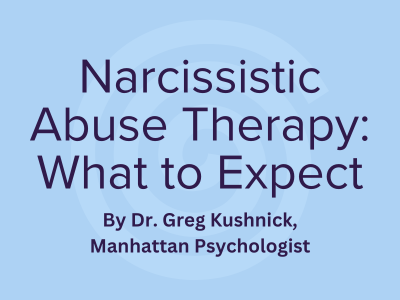
Narcissistic Abuse Recovery Therapy in NYC: What to Expect
In my years of experience as a psychologist in NYC, I have come to the conclusion that the hardest part of therapy for people who have endured narcissistic abuse from a romantic partner, parent, sibling or boss, is actually starting therapy in the first place.
Everything else seems to unfold with greater ease once the process begins. It’s as though everything you’ve endured in an abusive relationship with a narcissist has created a wave of resistance, an uphill climb through self-doubt, guilt, shame and confusion that dilutes any effort to take care of your mind and body. However, once you place yourself in a safe therapeutic space for processing the abuse with an experienced psychologist, something shifts.
An amazing thing happens. You start to learn who you are separate from the abusive relationship. You see the tactics of the narcissist more clearly and you start to respond differently. You learn how to begin to set better boundaries that give you a sense of mental freedom and control. You feel like you have more of a sense of choice. Narcissistic Abuse Recovery Therapy can change your life if you let. I have seen the effects over my 20+ years as an NYC psychotherapist and it’s remarkable.
I’ll Meet You Where You’re At
I will support you at whatever stage you’re at in the relationship. Some people come to therapy needing help to leave an abusive relationship. Others have already left and are needing assistance with the fallout of the separation. And some people have decided to stay in a relationship with the narcissist because of other factors like the presence of shared children or a work situation they cannot yet end. I will meet you where you are. No judgment. Let’s help you to get a handle on the difficult aspects of exposure to narcissistic abuse.
Manage Shame and Self-Doubt
The main psychological weapon of choice for narcissistic individuals is self-doubt. As long as you are questioning yourself, foggy minded, ambivalent, confused and shameful, the narcissist has control. I help my clients come out from under this blanket of self-doubt. It’s so liberating when it happens and it’s one of the most gratifying parts of my job as a therapist who specializes in narcissistic abuse in New York.
Learn the Tactics of Narcissistic Abuse
I will make it easy for you to understand the specific tactics of the person who is manipulating and harming you. As a result, you will be more prepared with a variety of tactics for feeling more empowered to cope with actual exposure to this individual or memories of troubling interactions with this person. My methods tend to be quite effective, especially for clients who are motivated to create something better for themselves.
Discover Who You Are Separate from the Relationship- Find Yourself!
Therapy for narcissistic abuse involves trying to come to terms with the treatment you’ve endured at the hands of a narcissist, and in that process is figuring out who you are separate from the relationship. Years spent as the child of a narcissistic parent has most likely conditioned you to think about yourself, your value, your abilities in terms of how he or she wanted you to think and feel. The same goes for a spouse or shorter-term romantic partner. Therapy will help you plug in to who you are and who you want to be for yourself and the world.
I find this work incredibly fulfilling and I’d love to have the opportunity to help you.
For more information about me and my approach, please consider listening to The Mental Illness Happy Hour podcast on narcissism on which I was a guest. Here is another the link to the podcast on Apple Podcasts.
If you’re not whether or not your partner is a narcissist, please take a look at my article on the signs of narcissism. As a therapist who specializes in narcissistic abuse recovery, I have seen so many different manifestations of abuse, so I am well-equipped to handle most issues related to narcissism.
Please feel free to reach out to me with any questions about getting started in therapy for narcissistic abuse in New York City. I offer in-person CBT therapy and online therapy from my Chelsea office.
All the best to you!!
Greg Kushnick
Learn More